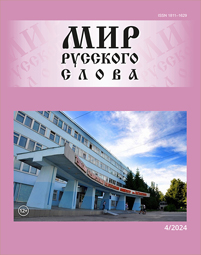“Mirror, mirror, GPT, tell me…” or the Phenomenon of literary texts in the postliterary Era
DOI:
https://doi.org/10.21638/spbu30.2024.406Abstract
The article focuses on the exploration of human — artificial intelligence (AI) interaction in the creation of literary texts, an increasingly pertinent issue given the rapid development of generative AI models and the evolving contours of contemporary culture. The study aims to analyze the dialogue between humans and AI in the process of collaborative literary creation, as well as to assess AI’s capability to produce texts that meet the requirements of literary genres and styles. The scientific and practical significance of the work lies in identifying AI’s potential as a tool capable of complementing and expanding human creative capacities in literature, as well as in delineating the boundaries of its use. The research methodology involves a series of experiments in which the ChatGPT‑4o model was used to generate texts across various genres, based on Alexander Pushkin’s novella “Dubrovsky”. The primary results indicate that AI-generated texts can adhere to genre and stylistic conventions; however, their artistic depth and ambiguity are contingent upon the quality of human-AI interaction. The study’s conclusions affirm that, at the current stage of AI development, productive forms of co-authorship are possible, with humans acting as active moderators of the process. The significance of the conducted research lies in broadening the understanding of the possibilities and limitations of AI in literary creativity, contributing to the advancement of digital literary studies. The practical value of the work consists in establishing methodological foundations for interacting with generative AI models in the contemporary literary process, thereby opening new perspectives for writers, educators, and researchers.
Keywords:
artificial intelligence, literary creation, generative models, digital literary studies, ChatGPT, A. S. Pushkin
Downloads
References
DIV>ЛИТЕРАТУРА
Downloads
Published
How to Cite
Issue
Section
License
Articles of "The World of Russian Word" are open access distributed under the terms of the License Agreement with Saint Petersburg State University, which permits to the authors unrestricted distribution and self-archiving free of charge.




